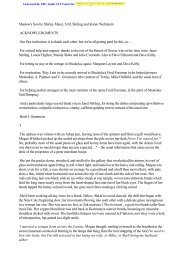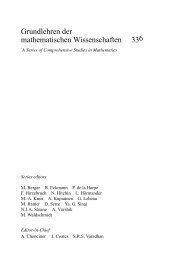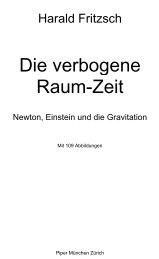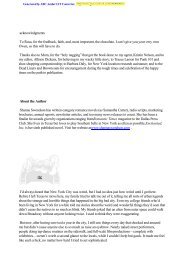Create successful ePaper yourself
Turn your PDF publications into a flip-book with our unique Google optimized e-Paper software.
pounds of bone and muscle with a ruddy face like a cured ham and a thatch of dark red-brown hair and<br />
little hazel eyes, built massively enough that you didn't realize his full height until he stood close. When he<br />
strung the heavy longbow, it was with an effortless flex of arm and hip.<br />
Aylward and Hordle had the same accent, a slow thick south-English yokel drawl out of deepest<br />
rural Hampshire; Barstow's was General American, what you'd expect from someone born in Eugene in<br />
1967 and raised there. But they all had something in common, something beyond the Mackenzie kilt and<br />
the weathered skin of men who spent much time out of doors in all weathers, an indefinable quality of<br />
coiled wariness even at rest, a readiness for sudden violent action that only another practitioner of their<br />
deadly trade might have caught.<br />
"There's a few improvements over the old plain crooked stick, y'might say," Aylward said. "The<br />
reflex out at the tips makes it throw faster, and the deflex in on either side of the riser keeps it stable.<br />
More accurate, less hand-shock. A strip of raw deerhide glued on the back, to keep splinters from<br />
starting."<br />
He grinned with mock modesty as his giant countryman examined the bow. It had a central grip of<br />
rigid black walnut root, carved to fit the hand and covered in suede-finished leather that would drink<br />
sweat and prevent slipping; just above that was a ledge for the arrow-rest, cut in so that it ran through the<br />
cen-terline of the bow and lined with two tufts of rabbit-skin. The tapering limbs with their subtle double<br />
curve were Pacific yew, mountain-grown for a dense hard grain, the orange heartwood on the belly of<br />
the bow and the paler sap-wood on the back. He'd made it the traditional length, as tall as the user when<br />
unstrung plus a bit, and it took a hundred and fifty pounds to draw it the full thirty-two inches. Few men<br />
could manage a draw-weight that heavy; Aylward's own war bow took a hundred and ten, and Chuck's<br />
was a hundred. Hordle managed this one easily enough …<br />
"What's this then?" Hordle said, flicking a sausage-thick finger at the inside of the stave just above the<br />
riser. "I thought you didn't hold wi' laminations?"<br />
"I don't," Aylward said, using the rag to wipe his hands clean of the linseed oil he'd used on the yew;<br />
it rasped a little as threads caught on the heavy callus on his hands. "Those fillets of horn are pegged into<br />
the riser and working free against strips of hardwood glued on the stave, ten inches either way of the grip.<br />
It gives it just that extra bit of"—he snapped his fingers out and back— "flick."<br />
Chuck Barstow grinned. "And you'll be the envy of the whole Willamette, with a bow from the hands<br />
of Aylward the Archer, himself himself," he said.<br />
Aylward snorted. "Bollocks," he said. "There's many I've trained who make bows as good as mine,<br />
and plenty more who're good as needs be, and I weren't the only bowyer around here to start with.<br />
Bowmaking isn't a master-craftsman's trade, you can learn it well enough in a few months if you're handy<br />
and have the knack, and God knows we've plenty of good yew in this part of the world. For that matter<br />
there's better shots than me among the Mackenzies, and no doubt more elsewhere."<br />
"You could still make a good living selling your bows," Barstow said. "Those two you taught do it in<br />
Sutterdown, full-time. They've had clients come from as far away as Idaho."<br />
"I like getting my hands into the dirt, when I'm not off on Lady Juniper's business," Aylward said<br />
stoutly. "And growing what I eat. Reminds me of growing up on the farm with Mum and Dad back in the<br />
old country." He jerked a thumb at Hordle. "Not far from where this great gallybagger idled his youth<br />
away."<br />
John Hordle gave a theatrical shudder. "Now, my dad owned a pub," he said to Chuck. "That's a<br />
man's life, I tell you. Chatting up the totty and tossing back the Real Ale, and none of that shoveling muck<br />
into the spreader on a cold winter's day."<br />
"Then why didn't you stay on at the Pied Merlin instead of going for a soldier?" Aylward asked.<br />
"Because of all the ruddy lies you told me about being in the SAS while I was still a nipper," Hordle<br />
said good-humoredly. "Ended up humping a full pack over every sodding mountain in Wales doing the<br />
regimental selection, I did. Which probably saved me life come the Change. Otherwise I'd have starved<br />
or got et, like most, instead of getting out to the Isle of Wight with the colonel."<br />
"Oh, I don't know," Aylward replied. "Sir Nigel always looked after 'is own. You told me he got my<br />
sisters and their kids out, didn't you? And he'd not seen hair nor hide o' me in years. From what you said,
















